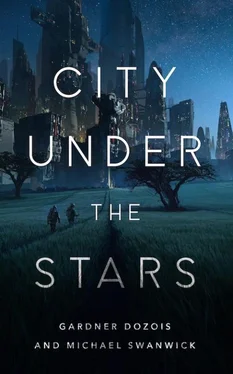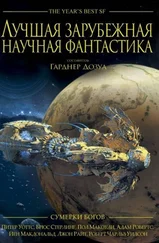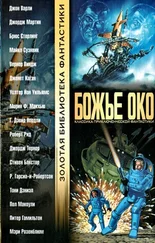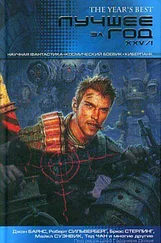Gardner Dozois and Michael Swanwick
CITY UNDER THE STARS
As coauthor of this book, I would like to dedicate my half
TO THE MEMORY OF GARDNER DOZOIS
who, I know, intended to dedicate his half
TO THE MEMORY OF SUSAN CASPER
but who, had he lived just a little longer, would almost certainly have added
AND TO ARABEL
IT WAS HIGH SUMMER in Orange, in York, in the Human Domain of Earth. There was commerce in the town, crops in the field, beasts in the byre, bandits in the roads, thants and chimeras in the hills, and God in His Heaven—which was fifteen miles away, due east.
From where Hanson worked—on an open platform extending out from the side of the giant State Factory of Orange and nestling right up against the bare, rocky face of Industry Hill—it was possible to look east, out across the teeming squalor of Orange, and see the Wall of the City of God marching north-south across the horizon, making the horizon really: a radiant line drawn across the misty blue of distance, pink as a baby’s thigh, pink as dawn. And to know that it stretched, in all its celestial arrogance, more than two hundred miles to the north, and more than three hundred miles to the south, unbroken, cutting three-quarters of the Human Domain off from the sea—the City of God, perfect and inviolable, with a completeness that was too much for man. That was what Hanson must face every day when he came to work and stood in the sun and in his human sweat with his little shovel. That terrible, alien beauty, indifferent to mortality, forever at his back, a head’s turn away, as he worked, as he grew old. And knowing that God and all the angels were in there, pure and incomprehensible as fire, maybe watching him right now, looking down over the Edge of the Wall and into the finite world: a huge watery eye, tall as the sky.
But no one ever thought much about God on shift, not for long. The sun was too hot in summer, the wind too bitter in winter, the work killing in any season, blighting and shriveling a man, draining him dry. There was too much sickness, not enough food, little medicine, little comfort, and only brief bitter joys. It soon became evident that God didn’t care about man, that He paid no more attention to the misery swarming beneath the Wall of His City than man pays to the activities of beetles, that He had no more compassion for humanity’s messy agonies than man had for the suffering and tribulations of mayflies. There were two State Temples of Purified Catholicism visible in the sweep below, and even the encircled cross that marked a kachina shrine, a kiva , but none of them were very well attended. In spite of its proximity to the Wall of the City of God—or perhaps because of it—Orange was not a devoutly religious town.
Hanson leaned into his shovel and watched the blade disappear into the coal. The pile sloped up and back, toward the lips of the gullet, through which new lumps of coal would rattle slowly down onto the top of the heap every few seconds, obliging the shift to keep up a steady tempo of work to avoid being swamped. On heavy days they would have to shovel like fiends to keep up, dumping the coal down chutes into hoppers on the lower transport level of the factory. But no matter how much they sweated, the coal remained undiminished, replenished constantly from the top as fast as they could clear it away from the bottom: a glossy black mountain crawling sluggishly with the unending inching motion of the coal. Hanson had even stopped hating it, regarding it now as a condition to be endured, something too big, impersonal, and constant to rail against, impersonal as a thunderstorm. His mother had told him an ancient tale once—a few months before she’d died in one of the food riots that were an aftermath of the Campaign Against the South—about women with brooms trying to sweep the sea free of salt. He often thought about the tale while on shift, and unlimbered the flinty thing that had served him for a smile the past few years, since his wife, Becky, had died coughing blood in the White Winter four seasons back.
It seemed that everyone he had ever known and loved had died, one by one over the falling years, leaving him here in the barren center of nothing, living on and on, alone. He had never wanted it that way. He’d never asked for that.
Taking a step backward, Hanson scooped up a shovelful of coal, pivoted smoothly, and tossed it over the curb and into the chute, turning back for another shovelful without bothering to watch the first fall. After years on the job, he could send a steady stream of coal anywhere he wanted it, with pinpoint accuracy, almost without looking. He placed his foot on the blade, dug it back into the pile, and stopped. Normally he would work like this for hours without stopping, steady as a mechanical thing, his motions flowing into an unbroken cycle. But today—today he could not keep his mind on his job, today he was like a child, distracted by anything, everything, the wind, the sky, the light glinting from his shovel blade. He leaned on the shovel, buried up to the handle in the pile, and watched the gullet spit up some more coal.
Somewhere up there, miles deep into the slope, miles beneath Industry Hill, maybe even halfway to Pitt, one of the last surviving Utopian autominers was burrowing and wallowing like a steel whale through a deep vein of coal, exploring the secret roots of the world. No—it was blind, and ate its way past wonders it could never see, so maybe tapeworm would be a better analogy than whale: a robotic, reactor-powered tapeworm that gnawed through Earth’s bowels with adamantine teeth, insatiably tracing the tightening convolutions of the intestines, passing the ore through its indestructible body and voiding it back along the endless tail of the conveyor field to the mouth of the gullet. Where it dribbled onto the pile and tumbled slowly down the grade so that Hanson or one of his shift-mates could scoop it up with a shovel and dump it into a hopper. Hanson had wondered once or twice at the Factory, at Orange, at the State of York—at the incongruity of a society that must use unbelievably sophisticated machines and primitive hand-labor as integral parts of the same industrial process. Horses pulled the loaded ore-hoppers across Orange to the Docks, where a monster Utopian transport waited to carry it on the long journey to the ancient blast furnaces in Pitt, then skirting the Wall to the pockets of industry in the Chesapeake country, and then to the South. Horses and transports, autominers and shovels. The Utopian machines were used where they could be used, to do the magic work no army of ordinary men could do. Where they couldn’t be used, where there were no machines anymore to be used for that , then the gap was filled in with hand-labor, with sweat and broken backs and sudden heart attacks. There were plenty of people after all.
And most of those people found nothing odd in the arrangement. Hanson had once worked with the Utopian autominers, years ago, before factory politics and the enmity of Oristano the foreman had started him on the long road down to the Pit, and when he had first arrived at the Pit, at the rock bottom of his career with nowhere to go except death, he had remarked to old Relk in a mixture of bitterness and grim humor that it was too bad they couldn’t scrape up a Goddamned Utopian machine to do the Goddamn shoveling. Relk had merely gaped blankly at him, unable to understand—Hanson might as well have spoken in a foreign language. Work was work; magic was magic; and that was that. Relk could see no incongruities, no connections between the two. He’d sniffed disapprovingly at Hanson and told him he wouldn’t last long in the Pit.
Читать дальше













